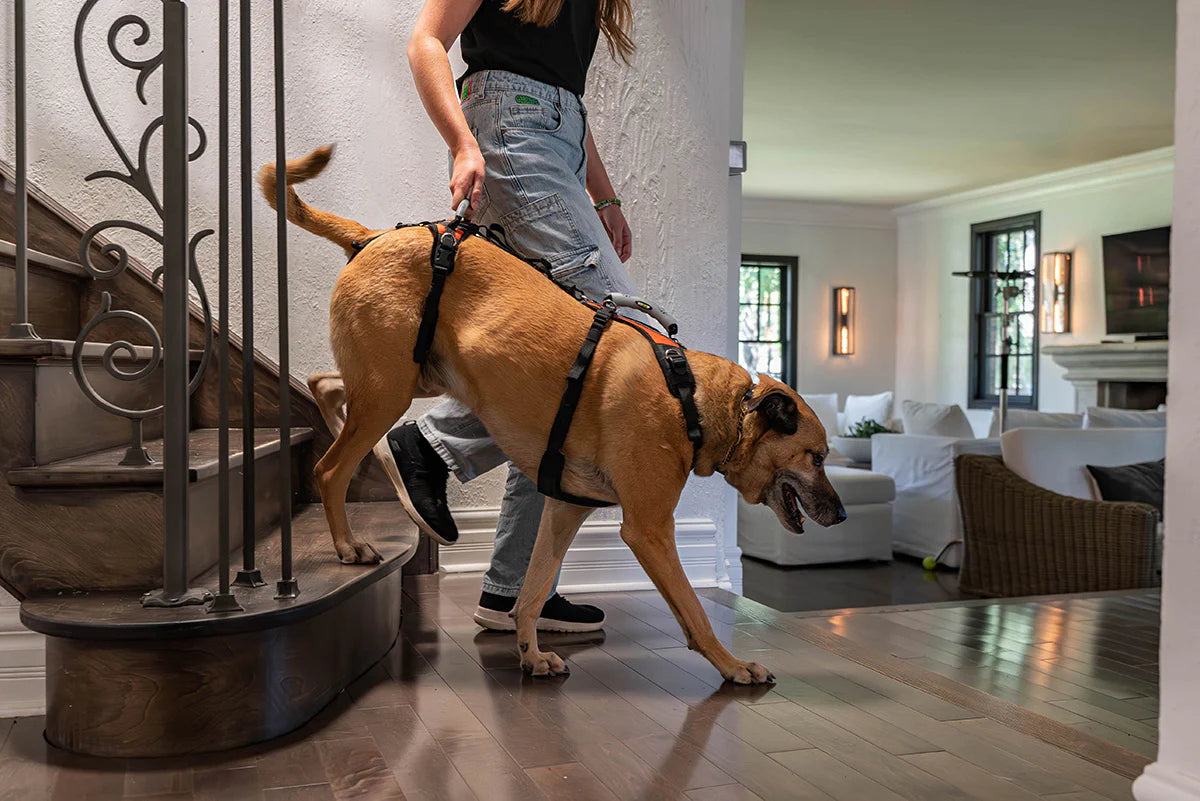3 Common Mobility Issues in Small Dogs

There's plenty of information out there on mobility issues in large dogs. Bigger breeds, with their long legs and large bodies, are prone to a number of injuries and illnesses like canine hip dysplasia. But what about small dogs?
Breeds like Chihuahuas and Corgis may be more compact and lower to the ground, but they develop some of the same mobility problems as larger dogs. Due to their size, some are even more likely to suffer from health issues.
We’re shedding some light on the mobility problems that affect smaller dogs and showing you how to get these pups up and moving again.
Small Breed Mobility Issues
The dogs might be adorably tiny, but Pomeranian, Boston Terrier, and Shih Tzu health problems are nothing to coo over. The same goes for Yorkies, Maltese, and every other toy or small breed you can name. Here are some common health issues that limit mobility in these small-but-mighty canines.
1. Brachycephalic Movement Syndrome
Brachycephalic dogs like pugs, Boston Terriers, French Bulldogs, and Shih Tzus were bred to have shorter muzzles and flatter faces. As a result, they have smaller airways relative to other breeds and often breathe through their mouths to get enough air. (That’s what causes the classic noisy breathing and snorting from pugs!)
Because of their small airways and penchant for mouth breathing, these breeds are prone to respiratory problems like inflammation that can make it difficult for them to get around. You may find your small breed getting tired easily or even collapsing after exercise or excitement.
Unfortunately, this is not an issue that a dog wheelchair can solve. Work with your vet to develop a plan for managing symptoms and avoiding dangerous situations like heat stroke. He or she may recommend surgery to clear obstructed nostrils or to shorten an elongated soft palate.
2. Degenerative Myelopathy
Degenerative myelopathy (DM) is a disease of the spinal cord that causes nerve damage and muscle atrophy. Ultimately, DM causes complete paralysis of the hind legs. Certain breeds are affected more than others—DM is one of several significant Corgi health issues, for example. Symptoms include a wobbly gait, dragging of hind legs, loss of balance, and incontinence. While there is currently no cure, the effects of the disease can be managed with proper treatment and the help of mobility aids.
3. Back Problems and Herniated Discs
Intervertebral disc disease (IVDD), also known as a herniated disc, occurs when the cartilage between a dog’s joints swells or ruptures, damaging the spinal cord. This can cause sensations from discomfort to extreme pain, as well as loss of reflex, a wobbly gait, and partial or full paralysis.
Dachshunds and pugs are particularly prone to back problems because their extended spines experience a lot of strain and pressure, leading to health issues like muscle spasms and slipped discs. French Bulldogs are also prone to herniated discs and other back problems, as they were bred to have short back legs and curled tails, leading to birth defects that put too much pressure on the spine.
Maintaining Mobility with Small Dog Wheelchairs
Your pup might be on the tiny side, but he or she probably has a big personality—and you don’t want to lose that to mobility issues. A dog wheelchair can put the bounce back in your small breed, improving quality of life and expanding range of motion. Worried that your dog is simply too little to fit into a cart? Put your fears to rest, because K9 Carts can design and build customized wheelchairs for small dogs under five pounds.
Dog wheelchair are ideal for canines suffering from degenerative myelopathy, a ruptured disc, spinal trauma, IVDD, and other conditions that limit the use of the front or hind legs. Think of them as the canine equivalent of crutches! Not only do these carts help keep a dog’s body and spine stable; they also prevent forelimb stress and work to decompress the spine, aiding in rehabilitation and helping to prevent further injuries.
Not every dog is a good candidate for a cart, so speak with your vet and give the towel test a try to determine whether your pet will benefit from a wheelchair and what kind of support will be best. Canines experiencing weakness or partial paralysis in their front and hind limbs will benefit most from a full support dog wheelchair, while those who only have trouble using their back legs can use a rear support design.
Get Your Dog Moving with K9 Carts
We’re proud to be the leading pet mobility experts, providing animal lovers with everything from high-quality dog wheelchairs to crucial mobility care information. What makes us experts? Years of experience, caring customer support, and a passion for helping animals. Our nearly 60 years of experience in the veterinary field have given us the tools and knowledge necessary to custom-build each of our convertible carts in the U.S.








